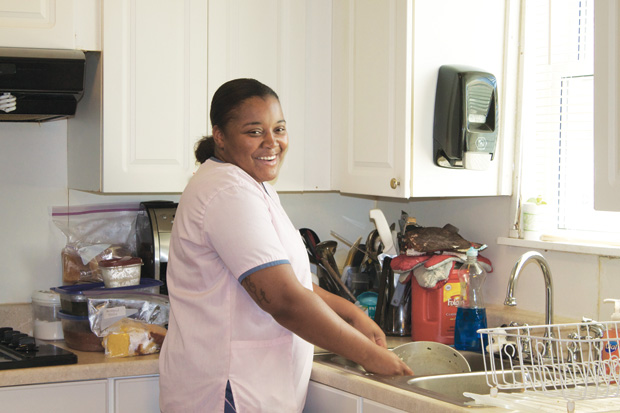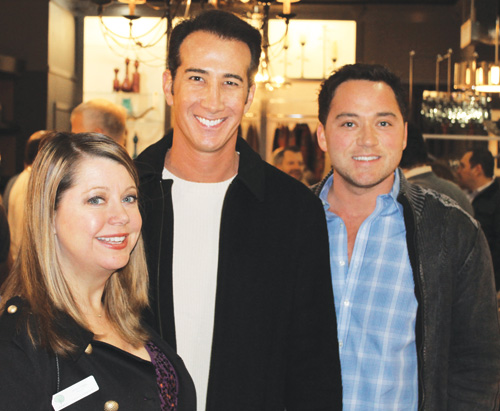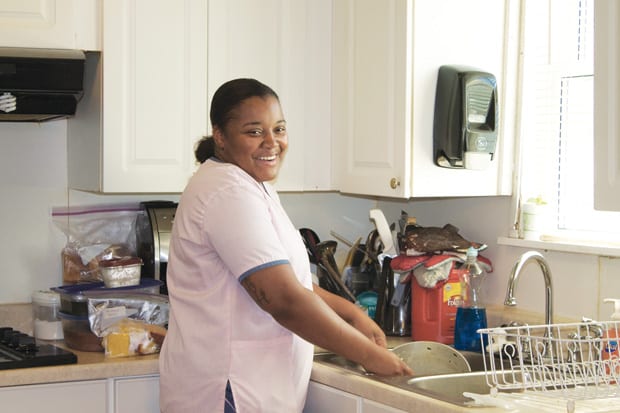Organized as a hospice where people with AIDS could die with dignity, the Founders Cottage is now a house of healing and recovery

CAREGIVER | Jasmine Johnson said, “This is my purpose,” as she chatted with clients while working in the kitchen at Legacy Founders Cottage. (Steve Ramos/Dallas Voice)
Brooke Nickerson’s father knew she’d never make money as a social worker. When she took the position of program director at Legacy Founders Cottage in Oak Cliff, he had even more trepidations.
Those concerns, however, were assuaged recently when Nickerson took her father to work with her.
Within a few hours, he saw her bettering the lives of people who previously had little hope. He watched her advocate on their behalf to make sure they were getting the best medical care. He saw a staff that was proud of the work they were doing and smiles on the faces of patients in their care.
“You really do make a difference,” he told her.
Legacy Founders Cottage has been making a difference in the lives of people with AIDS since 1996, and this month, parent organization Legacy Counseling Center celebrates its 25th anniversary.
Mike Vanderwater, one of the founders for whom the Cottage is named, donated the house. Melissa Grove was hired as its first director.
“I thought I’d do it for a year,” Grove said.
When the Cottage opened, everyone had a terminal diagnosis. Within a year, protease inhibitors had been approved, and people began living with HIV. Grove thought her days in AIDS care were numbered, but today she is executive director of Legacy.

RUBBING SHOULDERS | Legacy Executive Director Melissa Grove, Legacy Board Chair Steve Weir and David Rogers attended a fundraiser recently at Home on Bishop. (Steve Ramos/Dallas Voice)
“We’re busier now than ever,” she said.
That’s because the focus changed. Instead of a hospice, the Cottage became a place of transitional and respite care.
Patients are usually released from the hospital before fully recovering. After extended stays, they have often lost their homes and all their belongings, so they’re released to a homeless shelter.
The Cottage gets people stabilized. When they’re ready, Legacy’s Home Base for Housing program helps them find a place to live, but first, some clients need to learn survival skills. One current resident, who asked her name not be used, said she’s learning to be compliant with her medications and is dealing with depression.
“The counseling has really helped me,” she said.
Although she still looks underweight, she’s gained 30 pounds in the past few months. She said she’d like to live on her own — something she’s never done before. It’s an option she’s exploring with housing coordinator Tonya Moore, who’s looking into group settings as well.
The resident said she still gets depressed a lot, but staff and other residents ask her if she’s OK.
“I like that,” she said, because she knows everyone at Legacy cares about her well-being.
Grove said the Cottage stops the cycle of re-hospitalization. Getting people stronger, having an advocate accompany clients to doctors appointments to find and treat any underlying health conditions and help them move into permanent housing all contribute to better outcomes.
Everyone who works at the Cottage shares that passion. Staff caregiver Jasmine Johnson said working at Legacy isn’t just a job.
“This is my purpose,” she said as she worked in the kitchen, chatting with a resident. “Whatever someone wants to talk about, we listen. We’re always there, and they count on us.”
She said the residents and staff become a family.
Nickerson said in the three years she’s been at the Cottage, they’ve moved more toward respite care and away from hospice. In her first year, five residents died. The next year only three. She hasn’t lost anyone in the last year, and none of the current residents is a hospice client.
“It’s very rewarding to see people come through the door who had no hope moving out on their own,” she said.
Moore said that’s not as easy as it sounds.
“Each resident has a housing plan,” she said. “The challenge is getting to the perfect intersection of ready to go and housing available.”
Legacy has several clients whose needs pose challenges. One current resident is undocumented and blind. He moves around the Cottage easily, but his blindness limits his outside housing options. His immigration status creates other obstacles that exclude him from some housing programs, Moore explained, but she approaches his situation as just another challenge.
Legacy operates with lots of volunteer help. Nickerson said Cottage volunteers cook, clean, shop, plan activities, take residents to appointments and hold fundraisers. Virtual volunteers even do database work from home.
To fill one volunteer opportunity, Nickerson is looking for someone with good shopping skills. She needs someone with a truck to make the Sam’s Club run once every two months and then break down the packages and arrange them in the storage garage to make things accessible.
Cody Ellison, co-owner of lifestyle home accessory store Home on Bishop in Bishop Arts is a big fan of Legacy and called the staff selfless.
“My take on Legacy is there but for the grace of God go I,” Ellison said. “Thank God I’m healthy.”
Each year his birthday party benefits Legacy, but raising money isn’t all he does. In April, his Bible study group will plant flowers and tend to the gardens at the Cottage. But more important than that, he said they’ll spend time chatting with the residents.
“The last thing anyone there wants is to feel like they’re outcasts,” he said.
Certainly no one at Legacy thinks of them that way.
This article appeared in the Dallas Voice print edition March 14, 2014.


